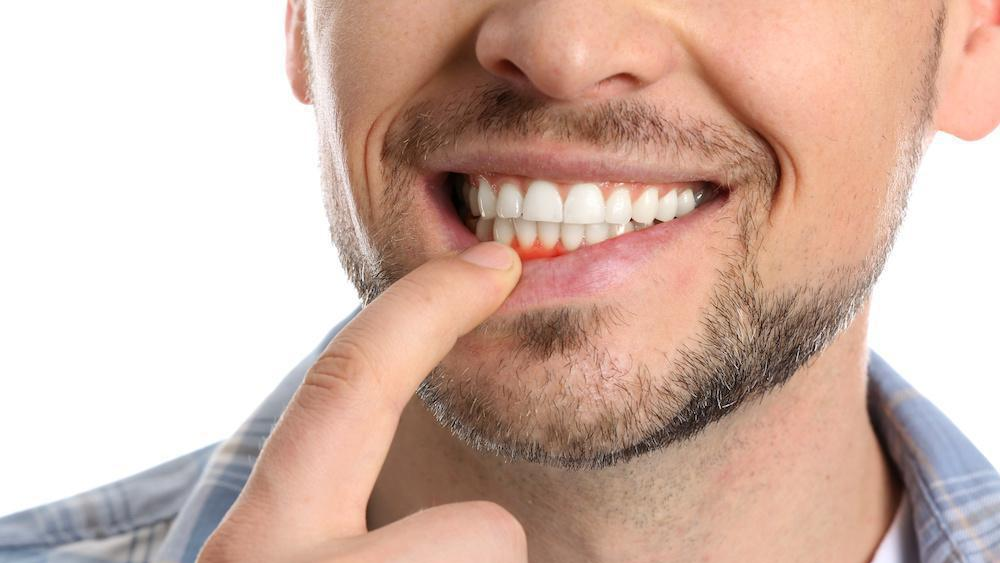Why Are My Gums Swollen? Causes and Treatments for Gum Swelling

At some point, almost everyone experiences swollen gums. This can be a minor problem that only needs a slight shift in oral hygiene to eliminate the condition. Or it could be a sign of a serious problem that will only get worse without the right care. The only way to know the cause and correct treatment is to get yourself to one of our wellness professionals who can give you an accurate diagnosis. In most cases, that means visiting your dentist.
When your gums swell, what is most important is that they are not left untreated. When these soft tissues develop sores, tenderness and redness, there’s a very good chance that the problem won’t have to go any further as long as the right care is provided to your teeth and gums.
A Closer Look at Your Gums and What Causes Problems
Gingival inflammation is a common condition that can be caused by a number of things, including plaque buildup, gingivitis and periodontitis. These three conditions are, essentially, three different levels of the same dental and oral situation.
- Plaque buildup:
A person who does not brush their teeth twice a day, does not floss daily and does not get regular professional cleanings at a dental office is likely to accumulate plaque on their teeth. Dental plaque hardens into tartar (also called
calculus) which can only be removed by a dental professional. Plaque buildup resulting from poor oral hygiene sets the stage for both
tooth decay and gum disease.
- Gingivitis: The gum tissue in your mouth is referred to as the gingiva. When this tissue is inflamed, that problem is called gingivitis. This is the early stage of gum disease that is marked by puffy, tender gums, gum pain and some bleeding when brushing and flossing. The gums may appear red and may start to recede. Gingivitis can often be reversed by getting the teeth thoroughly cleaned on a regular schedule and improving the at-home hygiene regimen.
- Periodontitis: This is the name for severe gum disease. At this point, it will take professional treatment to eliminate this disease. When gum disease has advanced to this point, the gums are tender to the touch and bleed easily. The gums may appear red or purplish. Chewing may be painful. There is a bad taste in the mouth or bad breath that can’t seem to be remedied. There may be pus between the teeth and gums. The teeth may begin to loosen and move. The gums recede more. Advanced treatment is needed to prevent tooth loss and halt the damage done to the structures that support the teeth.
Other Causes of Swollen or Inflamed Gums
While the problems above are the most common causes of gums swelling, there are some other health problems that can also cause swollen gums. While they are less common, they should be taken into consideration when determining the correct course of treatment. After taking a thorough medical history, your
StarBrite Dental dentist will help you determine if any of these health conditions could be causing or contributing to your problem:
- Allergies to pollen, dust or foods
- Trauma
- Hormonal changes including pregnancy, puberty or menopause
- Viral or fungal infection
- Infection from disease-causing bacteria such as streptococcal gingivitis
- HIV/AIDS
- Oral cancer
- Food irritation
- Excessive heat from cooked foods
- Nutritional deficiencies
- Abscessed tooth
- Reactions to medications
- Inflammation from autoimmune disease
- Poorly fitting dentures, retainers or other dental appliances
As you can see, there are many causes of swollen gums. The right thing to do when you are experiencing
gingival swelling or bleeding gums is to see one of our expert dentists to get the right diagnosis for the problem. The resolution of swollen gums may require medical treatments in coordination with a medical doctor, a shift in medications, a move to a well-balanced diet, or avoidance of alcohol or tobacco use,
Why Swollen Gums Should Be Treated Right Away
The outcomes of inflamed gums can be serious. These serious complications can include receding gums, loose teeth,
sensitive teeth, tooth loss, and the spread of infection to other parts of the body. In short, inflamed gums could be the starting point of health conditions that destroy your smile and your overall health. These serious outcomes can often be avoided when the right care is received.
If gum disease has progressed to the point of periodontal disease, there is absolutely no time to waste. You must
start to treat your swollen gums immediately. The specific treatment you receive will depend on the exact cause of your inflamed gums. A correct diagnosis could require taking a medical history, an examination of your mouth, x-rays, blood tests and more. Then the right treatment plan can be developed.
Treatment of the Causes of Inflamed Gums
There are many levels of
treatment for red and swollen gums. Gum swelling can be treated with antibiotics, antiseptics or anti-inflammatory medications. In severe cases, surgery may be necessary to
repair or remove damaged gum tissue. Here are some of the kinds of dental treatment that may be recommended, ranging from gentle changes to more serious treatments.
- Consistent schedule of preventative dental care visits
- Professional cleanings
- Scaling, the removal of tartar from below the gum line
- Root planing, the smoothing of any rough areas on the teeth below the gum line
- Gum grafts to restore gumlines that have receded due to gum inflammation
- Oral antibiotics
- Oral rinses
- Surgery to drain an abscess
- Laser surgery to remove and reshape damaged soft tissue
Most of the causes of
swollen gums are quite treatable. For that reason, it is wise to see your dentist as soon as possible before any damage becomes permanent. Even if gum disease becomes advanced, we can often
repair much or all of the damage and preserve your smile.
Preventing Swollen Gums
Many cases of swollen gums can be prevented with proper and consistent care. That’s why we educate our StarBrite Dental patients on the need for regularly scheduled appointments with our dentists. We can detect the earliest
symptoms of gum disease and recommend the right changes to prevent its progression to periodontitis. Our goal is a healthy mouth that helps you keep your smile beautiful for your whole life. Here are the beneficial practices you can adopt to prevent swollen gums:
- Brush at least twice daily and floss daily. This helps remove the daily accumulation of dental plaque as well as removing food particles from the teeth and mouth.
- See your dentist at least twice a year. A few people at high risk for swollen gums might be asked to visit the dentist more frequently. Your hygienist will scrape and polish away tartar and provide any needed advice on an improved brushing technique. Follow your hygienist’s recommendations on the type of toothbrush and hygiene products to use, and any mouthwash or toothpaste that is recommended.
- Avoid the use of tobacco products.
- Minimize use of alcoholic drinks.
- Eat a balanced diet. Make sure you are eating foods with plenty of vitamin C which is vital for healthy gums. This is especially important for older adults who may not obtain enough vitamin C in their diets.
- Drink plenty of water. Staying hydrated improves your overall stress. Being hydrated also enables you to produce saliva which helps keep your mouth healthy. And, if you drink water after a meal, it helps wash away food particles in your mouth.
- Complete any needed dental care promptly. Addressing cavities as soon as they occur can prevent an abscess that could inflame the gums in that area.
- Try to reduce your stress. High levels of stress can lead to inflammation in many areas, including in your gums.
Frequently Asked Questions About Swollen Gums
- Why are my gums swollen?
It could be something as simple as food particles trapped in your gums. Try gently brushing, flossing and rinsing. If it does not resolve, make an appointment with your dentist for an evaluation of the cause and treatment. Doing this right away can prevent serious problems from developing. - What is gingivitis?
A mild, early form of gum disease that causes redness, swelling and soreness. There may be some bleeding while brushing or flossing. It could feel like there is heat coming off the gums. The primary cause of gingivitis is poor oral hygiene. It is important to prevent the accumulation of plaque on the teeth through regular brushing, flossing and professional cleanings. - What is periodontitis?
A more serious, advanced gum disease that begins to damage the soft tissue and supporting structures of the teeth. It can also cause bone loss. It can be identified by sore, swollen gums, bad breath, pus being released from the gums, loose teeth, bleeding while brushing or flossing. Periodontitis can easily lead to loss of all the teeth. For many people, periodontitis is preventable by brushing thoroughly at least twice a day, flossing daily and getting regular dental care. Professional cleanings at least twice a year are essential to prevent gum disease and tooth loss. - What are the possible causes of the gum's swollen state?
Irritation from food particles, allergies, drug reactions, dry mouth, gum infections, tooth abscesses, vitamin deficiency, hormonal changes, among others. Because mouth cancer is a possible cause of swollen gums, it is essential to get a professional examination as soon as possible.
- What are the risks associated with swollen gums?
Gums could become swollen for simple reasons like a popcorn shell getting wedged between the teeth. But they also become swollen for health-threatening reasons like deep infection throughout the gums or mouth cancer. The only way to know is to see a dentist and get the right diagnosis. Infected gums that are left untreated can result in bone loss in the upper and lower jaws that then causes tooth loss. Bone loss and tooth loss can also make a person look older very quickly. Perhaps worst of all, infection in the gums can make its way into the blood flow in the area and be carried via the blood vessels to other parts of the body. This spread of infection can contribute to severe health problems like heart disease or diabetes. Other symptoms include low birthweight babies, respiratory disease, rheumatoid arthritis and difficulty controlling blood sugar. - What does the swelling feel like?
A gum swelling feels like a puffy, enlarged, tender area of the gums. It can be limited to the area around one tooth or it may exist throughout the mouth. Whenever you notice swollen gums, the problem should be addressed as soon as possible, before it can damage the supporting structures of your teeth. - Who is the best person to talk to about this?
All of the highly trained and experienced dentists at StarBrite Dental can provide you with relief from inflamed gums. Should you need advanced treatment to eliminate the problem before it can do permanent damage, StarBrite Dental has a skilled on-site periodontist who can be called on to help you treat swollen gums. We are happy to help you get your questions answered so you know exactly what needs to be done to eliminate the cause of diseased gums or any other dental problem.
The Professionals at StarBrite Dental Are Ready to Help
With every patient and with every condition we treat, our highest concerns are the health, well-being and comfort of each individual. For this reason, we maintain the
highest standards of technical excellence and patient service. Every one of our professional staff advances their skill and knowledge each year so we are always providing the latest and most effective dental technology.
When you find your gums sore, the right place for you is with one of our wellness professionals. Experiencing swollen gums can be a sign of a serious problem that is developing. Home remedies may help for a moment but also can mask a problem that needs professional care. Please let us know immediately when you need help preserving your oral health. With many decades of training and dedication present in our professional staff, we are ready to help.
Whenever you need help with swollen gums, call us at
(301) 770-1070 to schedule an appointment. We are ready to help care for swollen gums or any other dental problem you might experience.


